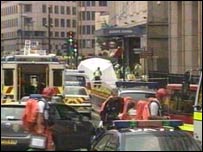
The number of casualties is rising
|
Share prices rebounded from early lows in the US and Europe after a series of deadly explosions in London.
In New York, the Dow Jones index rose to close up 0.31% after assurances from homeland security.
The UK's FTSE 100 index fell 1.36% to 5,158, having earlier slid 3%. Markets in France, Germany, Holland and Spain also bounced back to trade 1% lower.
"Five years ago, the market would have been down much more. Now we see it as a buying opportunity," said one trader.
The pound dipped as investors bought Swiss franc and gold, while the price of crude oil also dropped in London before recovering from lows.
'Business as usual'
Despite the huge disruption caused by the explosions, dealers reported no major panic selling.
"Frankly, things are remarkably resilient if you think the FTSE is actually only at levels where it was last week," said Will Armitage at IG Index.
"There's not the panic we saw on 9/11 when we had people ringing up and saying 'get us out of everything'."
The BBC's business editor, Jeff Randall, reported that people in the City had stayed in their offices and remained calm.
"Traders had been expecting something like this for some time because of the world situation," he said.
"Clearly the emergency services acted very quickly. Very few people have tried to leave. It's business as usual. That's what they're hoping for."
In the US, where stocks initially slipped, confidence recovered after the homeland security secretary said there is no "specific credible evidence" of a similar attack in the US at this time.
Staying vigilant
European Central Bank president Jean-Claude Trichet said that he had been in talks with counterparts in the US and UK about the level of interest rates.
After speaking with Alan Greenspan and Mervyn King, Mr Trichet said that "we are alert, we are vigilant". After their scheduled meetings on Thursday, the ECB left its borrowing costs unchanged 2%, while the Bank of England also kept its interest rate at 4.75%.
A number of City buildings were evacuated following the blasts. The London Clearing House was evacuated but transferred its operations to a disaster recovery site.
The London Metal Exchange cancelled dealing on its trading floor for the day, although it said electronic trading was continuing.
City-wide problem
 |
LOCATION OF LONDON BLASTS
Edgware Road tube station
Between King's Cross and Russell Square stations
Between Liverpool Street and Aldgate East stations
Buss in Russell Square
|
The explosions took place on the Underground network and on a double-decker bus in London.
London's police chief Sir Ian Blair said there had been "many casualties" and the latest figures showed that more than 30 people had died.
British Transport Police originally said some of the explosions had been caused by power surges.
But speaking from the G8 summit in Gleneagles, UK Prime Minister Tony Blair said London had been "hit by a series of terrorist attacks".
Uncertainty
The financial shockwaves were felt as far away as South Africa, where shares dropped nearly 3% before recovering to stand 0.6% lower.
"This is all on the back on the London underground incidents, and particularly the bus blast," said one Johannesburg trader.
Insurers, transport and leisure stocks bore the brunt of the sell-off in London. Shares in British Airways fell 4.2%, while travel group First Choice fell 2.8% and cruise operator Carnival was down 2.2%.
Prudential fell 1.9%, Royal & Sun Alliance 2.9% and building group Hammerson dropped 2.1%.
"Insurers are always first to get hit in a situation like this, in addition to the tourism industry," said Guiseppe Amato, analyst at Lang & Schwarz.
Sterling fell to a 19-month low against the dollar and sank 1% to a 6-week low against the euro.

